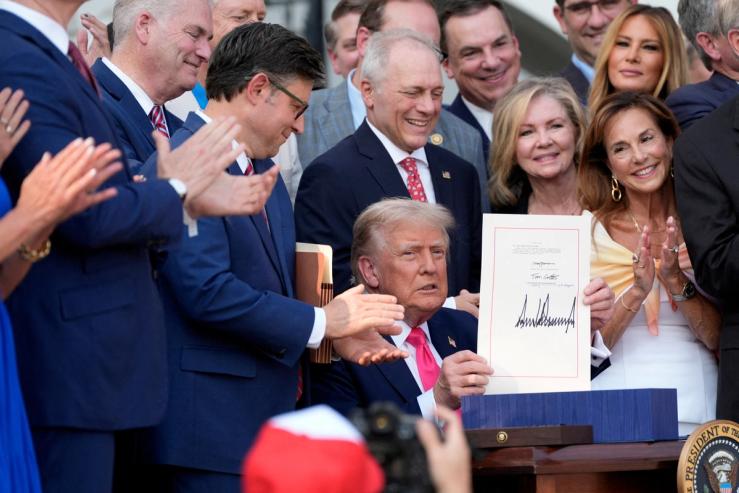David’s view
Democrats love to describe the “chaos” President Donald Trump is causing in Washington. Hakeem Jeffries, who likes to speak in alliterative triplets, calls this a time of “chaos, cruelty, and corruption.” Midterm candidates say they were inspired to run to fight the “chaos.” When I followed potential presidential candidates to South Carolina this month — Gavin Newsom and Andy Beshear were just there, Ro Khanna en route — heads nodded at any mention of chaos or exhausting DC news.
Imagine that you’re not watching that news. (This is a thought experiment. Don’t stop subscribing.) The administration wanted a suite of tax cuts by July 4, and it got them. It wanted DOGE to hollow out “woke” federal agencies; after some embarrassing court reversals, it got that. It wanted to defund public media and end foreign aid, and it pulled that off with something any prior Republican administration could have done: Impounding the money, then getting a GOP majority to claw it back.
The anti-Trump “resistance” has done what it promised in December, and made all of this harder. But month by month the administration is dismantling government programs that would be hard for anyone to reconstruct, and setting new priorities that will be hard to reverse.
Specifically: Republicans have learned, three times this century, that if they cut income taxes, Democrats will keep most of the cuts in place. When Democrats passed the Affordable Care Act in 2010, Republicans promised to repeal it. When they passed the Inflation Reduction Act, Republicans promised to repeal it. They largely failed at the first task and largely succeeded in the second. But even in friendly rooms, Democrats are not promising to repeal the One Big Beautiful Bill Act in toto.
Will Democrats fully restore the Department of Education? Recreate USAID? They haven’t said so. Tim Walz, arguably the most progressive of the Democrats showing up in primary states, told me that the next Democratic president had “an opportunity to create the agencies the way we saw them in the first place.”
Would Democrats fully refund NPR and PBS? It will be three and a half years, at least, before they get a chance to, and they don’t know what of those institutions will be left. Would they repeal the new ICE money that has turned it into one of the best-funded law enforcement agencies on earth? Jeffries has promised “aggressive oversight,” not defunding.
Would they repeal all of the new tariffs? They didn’t when Biden was president. Restart DEI offices? Please. Democrats see the new stories of migrants self-deporting as an anti-American horror. Republicans see homes and jobs that will be freed up for citizens, and migrants who’ll never come back.
The real Democratic conversation about a post-Trump agenda won’t get underway until 2027, when their presidential candidates stop being so coy about what brought them to Charleston and Nashua. But Republicans have stopped fearing “the ratchet effect,” the theory that government programs never contract once expanded.
Think of what survived in the Biden interregnum: The border wall (which activists wanted him to dismantle), the US embassy in Jerusalem (with its commemorative Trump plaque), the Space Force, the 2017 tax cuts. There was plenty of “chaos” coverage when Trump notched those wins, but it didn’t really matter. Democrats are confident that they can run against the OBBBA and its Medicaid cuts, and some Republicans have already grown wobbly about them. But the rest of the Trump agenda? The ratchet effect is going the other way.
Notable
- The nonpartisan Congressional Budget Office estimates the Trump administration’s “big, beautiful bill” will add $3 trillion to the country’s deficit over 10 years, or $5 billion if made permanent.
- Democrats agree that after Trump, there can’t just be an unwinding of the president’s policies — society needs to fundamentally change. But they can’t agree on what those changes should look like, NBC reported.


